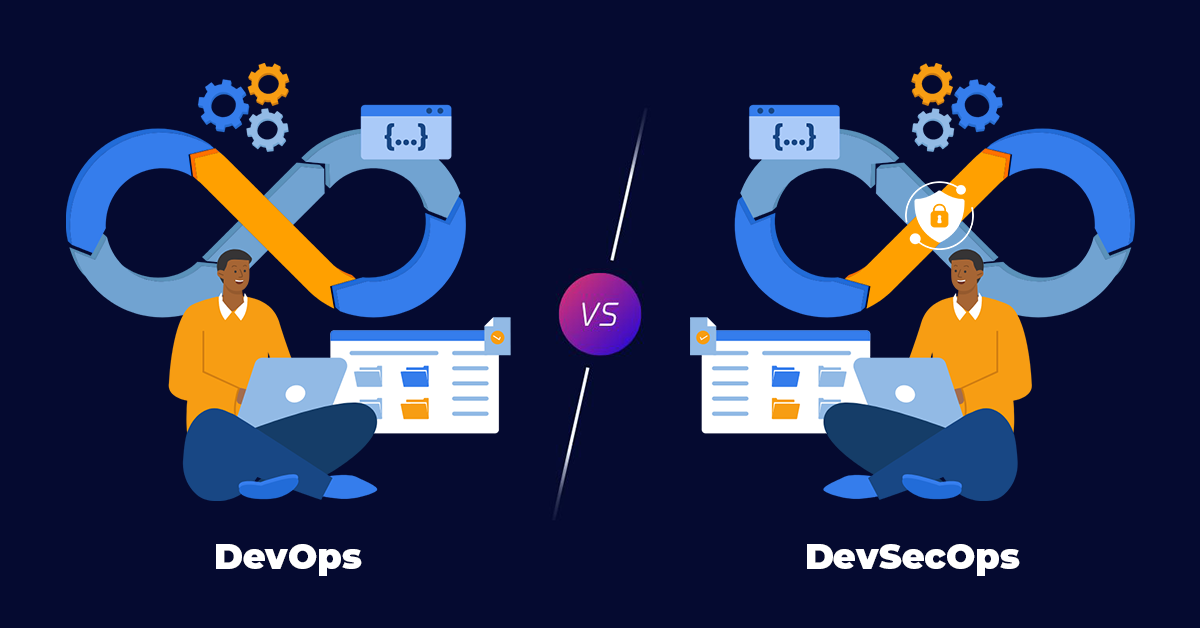DevOps & DevSecOps: What Are the Key Differences Between the Two?

4 min read | By Postpublisher P | 31 January 2023 | Technology
DevOps and DevSecOps have a common aim to improve the efficiency of software development. But both have key differences in terms of focus and goals. DevOps is mainly used for integrating development & operation teams, whereas DevSecOps adds an extra security component to it.
In this blog, we shall explore all about DevOps and DevSecOps to know the benefits, challenges, and applications. Also, let’s find out how both can be used simultaneously for creating a holistic approach to software development.
 Different Phases of DevOps:
The below four phases consist of the development (DEV) process.
Different Phases of DevOps:
The below four phases consist of the development (DEV) process.
 It leads to a new culture where developers work with security issues in mind right from the initial phase of coding and building. This makes the total process inexpensive as it eliminates the time gap for fixing the vulnerabilities after receiving feedback from the security team.
It leads to a new culture where developers work with security issues in mind right from the initial phase of coding and building. This makes the total process inexpensive as it eliminates the time gap for fixing the vulnerabilities after receiving feedback from the security team.
Development & Operations – An Overview:
The software development process has two teams in general – the development team (dev) and the operations team (ops). The role of the development team is to design and develop things from scratch and the role of the operations team is to test and implement the developed product. The end product is modified by the feedback received from the operations team.The issue:
- When the developer has completed a work they send it for testing. It takes a considerable amount of time for the operations team to give feedback. This idle time slows down the development cycle.
- Further, if a developer is working on a new project and receives feedback to fix a bug in the old project, the time duration for both projects will be prolonged for months.
The solution:
Combining both development and operations to work together— known as the DevOps approach.DevOps:
DevOps is a process framework with an infinity symbol that represents a continuous process of improving efficiency and mutual collaboration. DevOps software development allows companies to fasten the working process to update the development cycle resulting in quick deliverables and consistent deployment. Different Phases of DevOps:
The below four phases consist of the development (DEV) process.
Different Phases of DevOps:
The below four phases consist of the development (DEV) process.
- Planning: The development team makes a plan with the help of application objectives according to the customer’s objectives.
- Coding: The development team starts working on the code once the planning is completed.
- Building: In the build phase, the code is executed using different tools like Maven, etc.
- Testing: Once the code completes the building phase, it is tested for bugs or errors – both manually & automatically.
- Deploy & Operate: The code is deployed and operated in the working environment.
- Monitor: The product is monitored continuously using automation tools and the feedback is fed to the planning phase which completes a cycle.
DevSecOps:
When the software development process is considered, there is one important team that often gets unnoticed – security team. Recently, many companies are taking security as a serious concern. Therefore, security is emphasized & integrated into the development and operations cycle which is termed as DevSecOps. The “Sec” is nothing but “security”. It leads to a new culture where developers work with security issues in mind right from the initial phase of coding and building. This makes the total process inexpensive as it eliminates the time gap for fixing the vulnerabilities after receiving feedback from the security team.
It leads to a new culture where developers work with security issues in mind right from the initial phase of coding and building. This makes the total process inexpensive as it eliminates the time gap for fixing the vulnerabilities after receiving feedback from the security team.
The benefits of DevSecOps include:
- Observability: The ability to measure the whole application delivery process step-by-step by close examination.
- Traceability: Helpful to prove what user story is deployed and managed in the run-time system.
- Confidence: Having the surety that the user story is tracked in every stage and what is delivered will be the same as required at the beginning of the pipeline.
- Developing well-formed user stories that are understandable by the development team.
- Integrating additional security features in the coding phase by involving Test Driven Development (TDD) for repeatedly testing the software against all test cases and pair programming where two programmers work together as a driver (who writes code) and navigator (who reviews the code).
- In the build phase, it is used to confirm that the code is built using the best practices, scan undeclared variables and analyze it for potential errors.
DevOps and DevSecOps
Understanding the difference between DevOps and DevSecOps is crucial for efficient software development. The below table explains the important points on both DevOps & DevSecOps.By implementing both DevOps and DevSecOps, organizations can ensure that their software is not only functional and efficient, but also secure and compliant with industry standards. At Colan Infotech, we improve the quality, reliability and security with expert led DevOps software development while reducing the risk and saving cost for our client’s businesses.DevOps DevSecOps DevOps is a software development method that emphasizes collaboration and communication between development and operations teams. DevSecOps is a variation of DevOps that places a focus on security throughout the entire software development lifecycle. Emphasizes automation and continuous delivery/deployment. Involves collaboration between development, operations, and security teams. Aims to improve the speed and reliability of software releases. Aims to improve the security of software releases by identifying and addressing potential vulnerabilities early in the development process. Prioritizes the use of agile and lean methodologies to improve efficiency and responsiveness. Incorporates security testing and validation into the software development pipeline. Focuses on using metrics and data to drive decision making and continuous improvement. Emphasizes the importance of compliance and regulatory requirements. Promotes a culture of experimentation and learning. Adopts a “shift left” approach to security, which means identifying and addressing security concerns as early as possible in the development process. Uses automation tools such as configuration management, continuous integration, and containerization. Utilizes security tools such as vulnerability scanners, security testing frameworks, and threat intelligence platforms.
The latest from our editors
Join over 150,000+ subscribers who get our best digital insights, strategies and tips delivered straight to their inbox.


